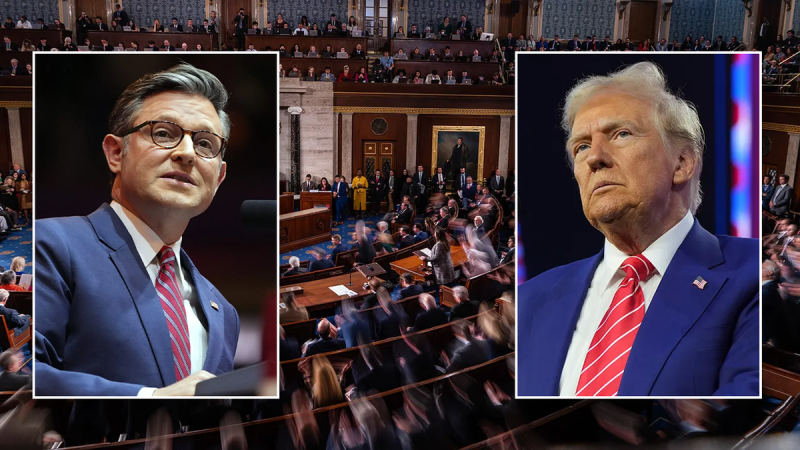President-elect Donald Trump’s winter White House is hosting a parade of House Republicans this weekend, all of whom are hoping that getting the incoming commander in chief’s ear will help an ideologically diverse group of lawmakers get on the same page on a massive conservative policy overhaul.
It is also likely to be another test of Trump’s power over Congressional Republicans and whether his influence will be enough to overcome longstanding fractures on fiscal policy.
‘The president is hosting multiple factions, right? It’s not just any one. The goal is to level-set the understanding of what we can accomplish,’ one GOP lawmaker told Fox News Digital. ‘Nobody disagrees, in broad brushstrokes, on the large goals. But there are very specific issues that are going to create concerns for folks. And we’ve got to work through them.’
On Friday, Trump is hosting members of the ultra-conservative House Freedom Caucus, several of whom voted against a government funding bill the president-elect explicitly backed last month.
He is also due to meet with senior Republicans and House committee chairs, as well as GOP lawmakers from blue states.
It comes amid disagreements between Congressional Republicans on the path forward for the budget reconciliation process. The mechanism generally has allowed one party in control of the government to advance their own agenda through one massive bill.
More specifically, reconciliation lowers the Senate’s threshold for passage from 60 votes to just a simple majority, putting it on par with the House of Representatives.
Reconciliation only allows for budgetary and other fiscal measures to be passed. However, both parties have traditionally tried to stretch those parameters to advance as much of their agendas as possible. GOP leaders have signaled they want to use reconciliation to deal with border security, energy policy, defense and to extend Trump’s 2017 tax cuts.
However, there is broad disagreement on whether to split those goals in half. Proponents of the two-track approach believe that passing an initial bill on border and energy policies will allow Republicans to score an early victory there while taking more time on tax policy.
However, those who advocate for just one bill argue that two reconciliation bills have not been passed in decades, given the heavy political capital needed for even one. They’ve warned that the strategy could put Trump’s tax cuts in danger of expiring.
The House GOP conference is also at odds on other details, such as whether to use reconciliation to raise the cap on state and local tax (SALT) deductions – a move favored by blue state Republicans who represent the suburbs of New York City and Los Angeles, but which rural representatives are against.
‘I think it’s gonna be a good discussion. I think this is a great opportunity for us to discuss not just SALT…This was just about, you know, blue state Republicans coming with our priorities,’ said Rep. Nicole Malliotakis, R-N.Y.
The Big Apple’s new congestion tax, tax reductions for seniors living off social security, and using the tax code to bring pharmaceutical manufacturing back to the U.S. were all agenda items Malliotakis named.
‘I have much broader agenda items than just SALT, but SALT is critically important for the New York members in particular,’ she said.
House Freedom Caucus member Rep. Barry Moore, R-Ala., suggested the border would be at the forefront of his mind for his group’s Trump meeting.
‘The main thing is, how do we move forward? It’s going to cost some money to secure our border. It’s going to cost some money to hire more agents. But at the same time, we’ve got to cut spending where we can,’ Moore told Fox News Digital.
‘We need to be on the same sheet of music and I think we’ll have an opportunity for Trump to hear from us, but as well for us to hear from him.’
Rep. Russell Fry, R-S.C., a staunch Trump ally who said he would also be at Mar-a-Lago this weekend, dismissed concerns about differences on issues like SALT.
‘I think the dialogue is important to have. At the end of the day, we need to deliver for the American people. And so while people feel differently on various issues, it’s important to have that dialogue to figure out how we can put this thing together,’ he said.
Trump himself has not publicly declared the specifics of what he would want to pass via reconciliation. He has said he favors a one-bill approach, but would also be open to two.
Malliotakis and other Republicans on the tax-focused House Ways & Means Committee favor one bill.
However, a member of the House Freedom Caucus doubted that would happen.
‘I think we’ll talk big-picture stuff as far as reconciliation. I’m of the mindset it’ll likely be two bills, not one. But I think that’ll happen organically, you don’t have to force it,’ they said.
Related Topics
House Of Representatives Politics
Republicans
Spending
Donald Trump
This post appeared first on FOX NEWS
